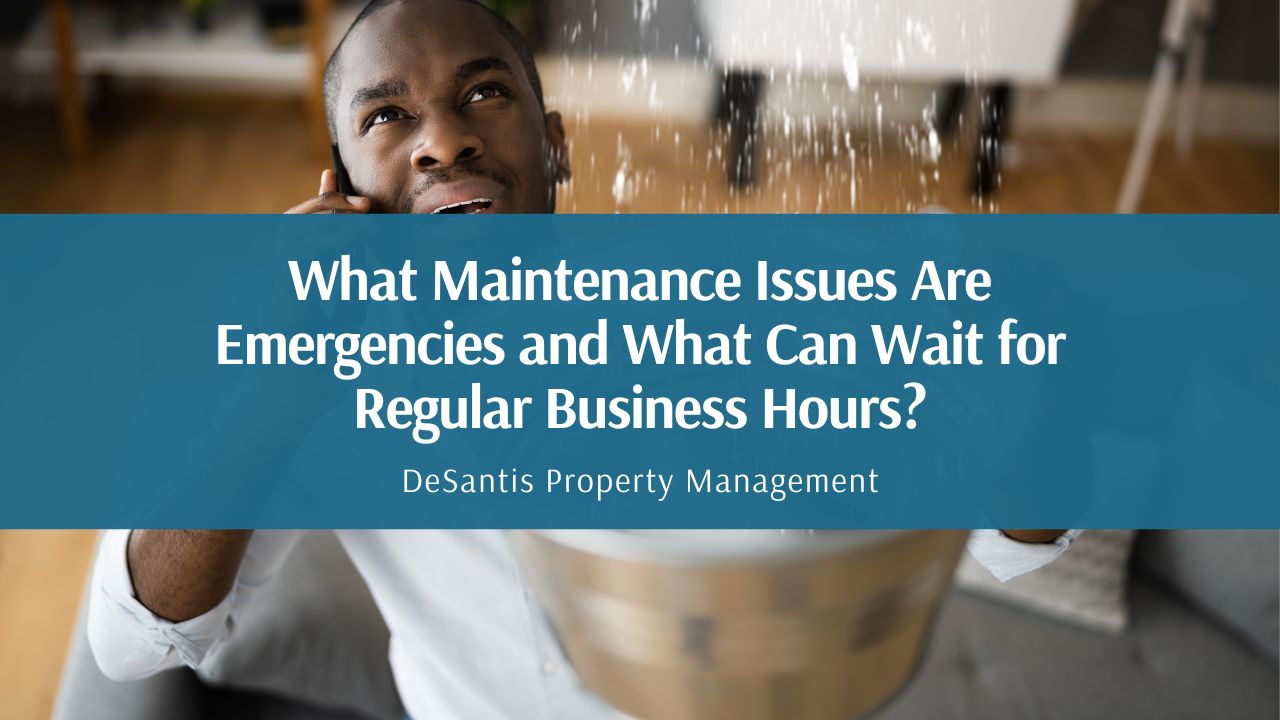A landlord doesn’t keep regular working hours. While you may try having standard 9-5 hours, sometimes, you'll need to get out of bed during a property emergency which can occur at all hours of the day or night. Because of the time commitment, it’s important to know what maintenance issues constitute an emergency and which can wait for regular business hours.
Being prepared is vital since emergencies can happen anytime in your rental space. This article will guide landlords on how emergencies are defined and how and when to handle them.
Defining Rental Property Emergency Maintenance
To resolve maintenance issues, one must be aware of what situations can be labeled as an emergency. Even if some situations can create inconvenience, they’re not automatically listed as emergencies.
Even if a problem happens beyond the workday hours, some maintenance issues can wait to be resolved in the morning. Below is a list to identify examples of non-emergent and emergent issues:
What is an Emergency?
Issues around the rental that have the potential to harm or injure and result in property damage, including risking the health and safety of residents can be labeled an emergency. Here are some listed examples of maintenance concerns that need immediate attention:
- Flooding, water lines, or frozen pipes
- Fire, gas leak, or broken gas line
- Broken doors or locks that can’t be secured
- Lack of heat in winter or air conditioning in hot conditions
- Electrical issues
- Sewer backup
- Leaking roof
- Extended power outage
- Break-ins by intruders
What is Not a Maintenance Emergency?
If the current incident doesn’t place the renters’ lives in danger or doesn’t contribute to severe property damage, this isn’t tagged an emergency. Below are some listed examples that renters can report for property maintenance during regular business hours:
- Lack of hot water
- Lack of air conditioning if the outside temperature is below 90 degrees
- Lack of heat if the outside temperature is above 50 degrees
- Malfunctioning appliance
- Noise complaints
- Minor leaks
- Burnt out light bulbs or fixture
- Parking disputes
How to Handle Rental Property Emergency Maintenance
Managing a tenant’s request is vital and landlords must create a proper process that can cultivate trust and lead to solid tenant relations. Here are critical characteristics that help you manage property emergency maintenance:
Reachability
Since renters depend on their landlords to guide them during emergency situations, landlords must strive to be accessible. Even during the late evening or early morning hours, you must be ready to provide instructions and answer the renter’s questions when a situation is deemed urgent.
Emergency Services
As a landlord, you must have access to police, fire, and utility services so you can contact them immediately when a property emergency occurs in your rental home. Build relationships with vendors and local emergency services so you can call 24/7 during critical situations. When you’re ready for these situations, you can better manage emergencies.
Open Communication
Even if the emergency is resolved, it’s recommended for landlords to be in contact with the renter to provide regular updates on the current status. Once the situation has been handled you should also follow up and ensure the tenant is happy.
Landlord Responsibilities
You also need to protect your time and learn to delegate duties. Learning what constitutes an emergency helps you deal with the situation right away. If an issue isn’t life-threatening or risks the safety of the residents, you can wait to address it during normal working hours or let the renters handle it.
If a situation isn’t categorized as an emergency, renters can report the issue and ask for property maintenance using the normal process. The landlord can then notify the renter of the maintenance schedule and repair the issue during regular hours.
Answering Vital Questions
Landlords have to decide fast in an emergency. They need to provide answers right away regarding what’s happening at the property. This helps everyone respond to the issue take. proper step to respond.
A Mindset of Understanding
During emergencies, renters can appear distraught and stressed. Landlords must remain calm and in control. But if the case isn’t categorized as an emergency, you can still speak to the renter and tell them to follow the established process for reporting maintenance requests. New renters might feel confused at first and mislabel a situation as an emergency so you must exercise patience.
Documentation
During an emergency, it’s impossible to document everything at the moment. But it doesn’t mean that you shouldn’t keep any records of the emergency situation. Note down the details, the repairs done, and the resolution and follow-ups made at a more convenient time so that you have a record of how to situation was handled. After the repairs are done, follow up with the renter and send an email to add to your document file.
Hiring Property Managers
Some landlords who prefer a hands-off management approach hire property management companies to oversee their rental units. Assess a management company based on their:
- Area of Expertise - Look for firms that specialize in handling your type of rental property. Some companies have more experience managing residential and multi-family units, others with HOAs, vacation homes, and commercial buildings.
- Support Staff - Ensure the property manager you choose has enough support personnel for operations to run smoothly. This refers to accountants, maintenance personnel, and administrative staff.
- Services Available - Evaluate what type of services a property management company provides so you know the benefits you’re paying for and if the management costs are justifiable.
Bottom Line
knowing the difference between emergent and non-emergent maintenance issues can save you a lot of time and stress. If you’re searching for a property management firm, contact DeSantis Property Management today! Aside from assisting you during property emergencies, they can also help with marketing, tenant screening, property maintenance and repair, and rent collection.





